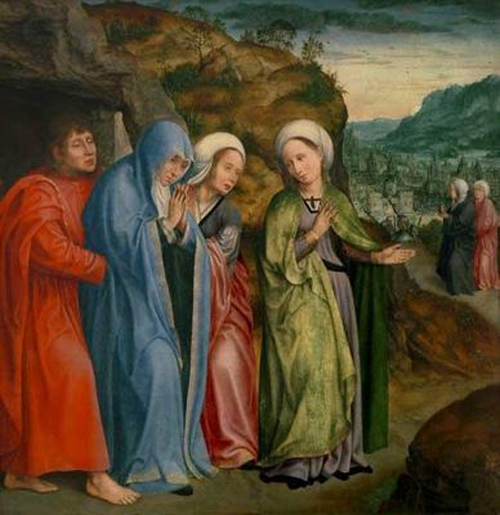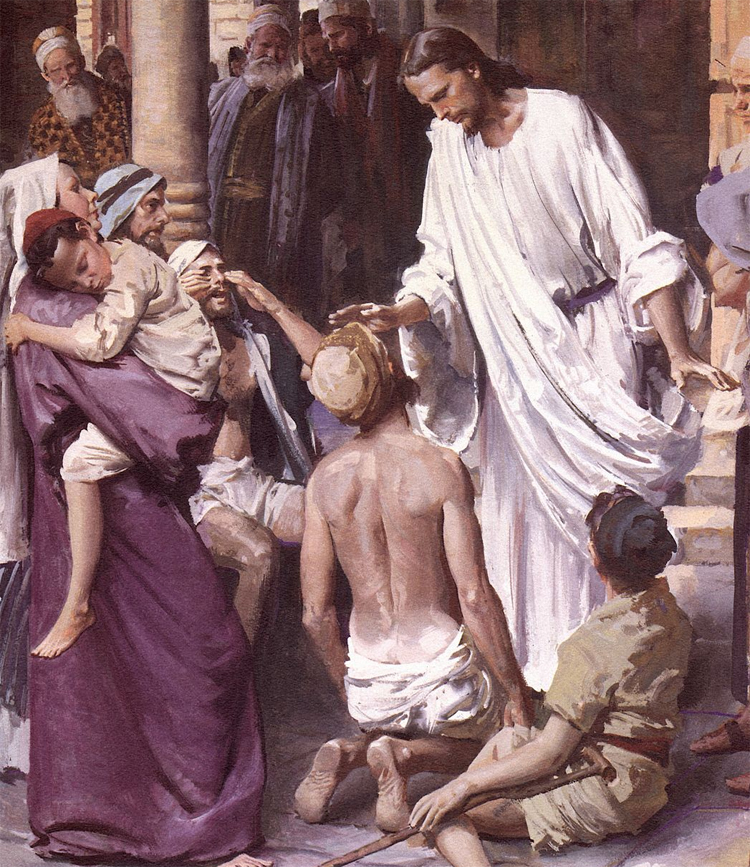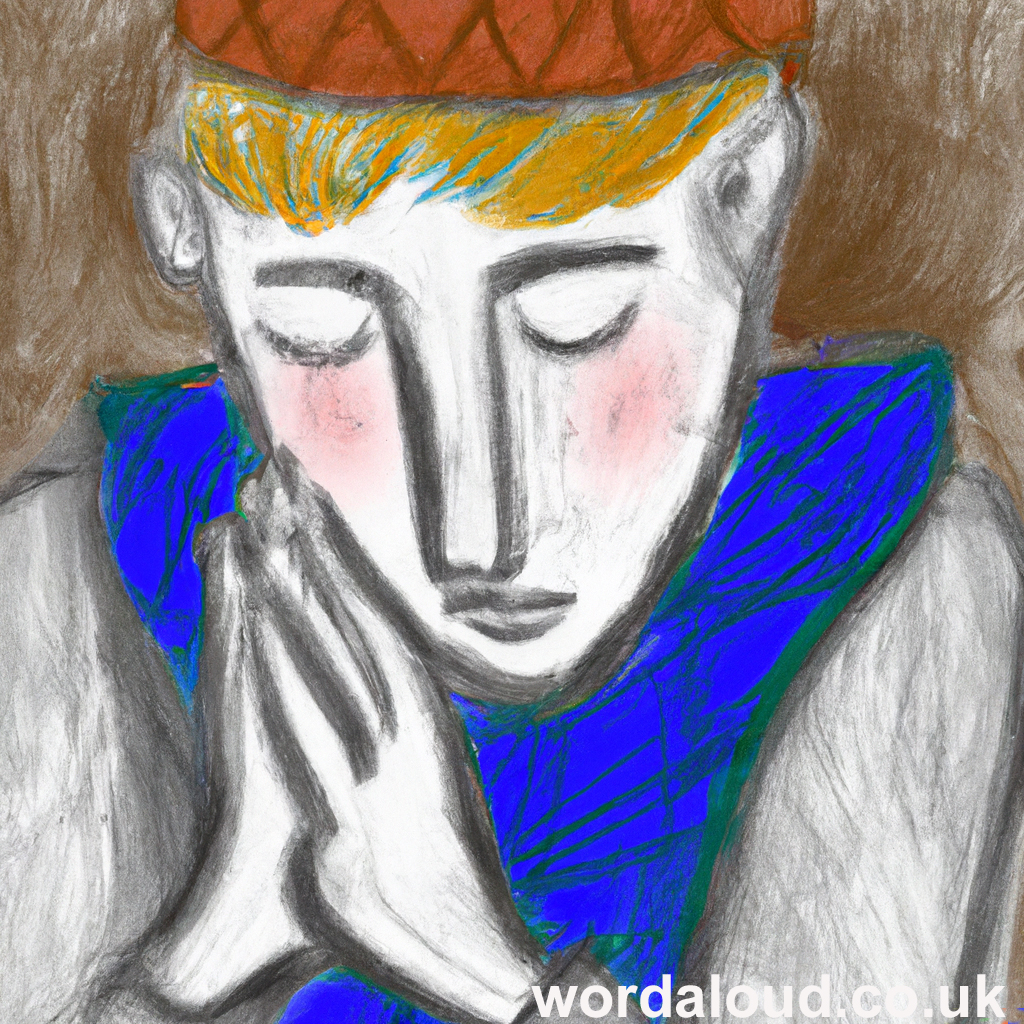Christian Art | Holy Women In The Gospels And The Early Church | King James Audio Bible KJV
Luke 8: 1-3 Week 24 Ordinary Time, Friday (King James Audio Bible KJV, Spoken Word)
1 AND it came to pass afterward, that he went throughout every city and village, preaching and shewing the glad tidings of the kingdom of God: and the twelve were with him,
2 And certain women, which had been healed of evil spirits and infirmities, Mary called Magdalene, out of whom went seven devils,
3 And Joanna the wife of Chuza Herod’s steward, and Susanna, and many others, which ministered unto him of their substance.
Yesterday, we heard in the Gospel of Jesus’ most merciful response to the woman who came to him begging forgiveness for her sins. Today we learn more about Jesus’ relationships with women. Given the understandings of the time, this Gospel account of the women in Jesus’ life is surprising and also inspiring. Luke’s Gospel has been considered the Gospel of women. In these Bible verses, we find the women who followed Jesus, as disciples, to be accounted as equivalent to the men.
The women clearly have a powerful role in Jesus’ ministry. They provide for Jesus. There are here women of some substance. Indeed, we might think of there being some aristocratic backing of Jesus, of women who operate at such a level in society as to grant them a high measure of independence. In the Church, there is some division of roles, while there is equality of dignity. There is no subjection of one sex or the other. In parish life it would be folly to think that it is the men who are solely in charge!
There is indeed a sense of family, as of generous and healthy Christian society, as Jesus goes about his mission. In hearing these Gospel verses, we may well think of our own parish communities, and register the great continuity between our time and the time of Jesus.
Concluding Prayer | Love Revealed By Jesus Christ
God of power and mercy,
who willed that Christ your Son should suffer for the salvation of all the world,
grant that your people may strive to offer themselves to you as a living sacrifice,
and be filled with the fullness of your love.
We make our prayer through our Lord.
![]()

King James Audio Bible | Endnotes
Women In The Gospels And The Early Church
The Gospels reveal that Jesus had a radically different approach to women from the ways of the society he lived in. Women in the ancient Near East were often viewed as inferior and subservient to men, and their rights were often restricted. However, Jesus challenged these societal norms and treated women with respect, dignity and compassion.
Jesus’ interactions with women were often marked by a willingness to engage with them on a personal level. For example, in John 4, Jesus speaks to the Samaritan woman at the well, asking her for water and engaging in a conversation with her. In doing so, Jesus broke with social conventions that prohibited Jewish men from speaking to Samaritan women. By speaking to her, Jesus demonstrated his willingness to break down cultural barriers and engage with people from all walks of life.
Jesus also demonstrated his respect for women through his actions. In Luke 7, Jesus is dining with a Pharisee when a woman known as a sinner enters the room and begins to weep at Jesus’ feet. She anoints Jesus feet with ointment, wiping them with her hair, and Jesus does not rebuke her for her actions. Rather, Jesus forgives her sins, saying. ‘Thy sins are forgiven.’ (Luke 7:48, KJV) This act of forgiveness and compassion would have been highly unusual in a culture that often shamed and ostracized women who were considered ‘sinners’.
Jesus’ relationships with specific women in the Gospels also highlight his compassionate and respectful approach to women. Mary Magdalene is a prominent figure in the Gospels, being one of the women who witnessed the crucifixion and resurrection of Jesus.
Joanna, the wife of Chuza, Herod’s steward, is another woman mentioned in Luke’s Gospel who supported Jesus and his disciples out of her own means. This suggests that women played an active role in Jesus’ ministry, not just as passive recipients of Jesus’ teaching, but as active participants in supporting his work.
Jesus’ approach to women was not limited to those who were considered ‘respectable’ or ‘virtuous’. In John 8, Jesus intervenes to protect a woman caught in adultery from being stoned by a crowd. Jesus challenges her accusers to examine their own sinfulness before casting judgment, and tells the woman: ‘Neither do I condemn thee: go, and sin no more.’ (John 8:11, KJV) By doing so, Jesus shows His willingness to extend compassion and forgiveness even to those who were considered social outcasts.
Women In The Resurrection Narratives
The role of women in the resurrection narratives of the Gospels is significant and notable. Women played a key role in witnessing and testifying to the resurrection of Jesus, despite the fact that in Jewish and Roman culture, women were not considered reliable witnesses.
In all four Gospels, it is women who are the first to discover the empty tomb and the resurrection of Jesus. In Matthew 28, Mary Magdalene and ‘the other Mary’ go to the tomb to anoint Jesus’ body and find that the stone has been rolled away and the tomb is empty. In Mark 16, Mary Magdalene, Mary the mother of James, and Salome go to the tomb and encounter a young man who tells them that Jesus has risen. In Luke 24, Mary Magdalene, Joanna, Mary the mother of James, and ‘other women’ find the tomb empty and are visited by angels who tell them that Jesus has risen. In John 20, Mary Magdalene goes to the tomb and finds it empty, and then encounters the risen Jesus.
Not only did women discover the empty tomb and encounter the risen Jesus, but they were also entrusted with the task of sharing the news of the resurrection with the male disciples. In Matthew 28, the angel instructs the women to ‘go quickly and tell his disciples that he is risen from the dead’ (Matthew 28:7, KJV). In Mark 16, the young man tells the women to go and tell the disciples and Peter that Jesus has risen. In Luke 24, the angels tell the women to go and tell the disciples what they have seen and heard. In John 20, Jesus tells Mary Magdalene to go and tell the disciples that he has risen.
The fact that women were the first witnesses to the resurrection of Jesus and were entrusted with the task of sharing this news with the male disciples is significant. In the culture of the time, women were not considered reliable witnesses in legal matters. Yet, the Gospels present women as the primary witnesses to the most significant event in the Christian faith. This underscores the importance of the resurrection and the credibility of the Gospel accounts.
The significance of women as witnesses to the resurrection is also important in terms of the role of women in the early Christian Church. Women played a significant role in the early Church, both as leaders and as supporters of the ministry. The fact that women were present and played a key role in the resurrection narratives suggests that their contributions to the early Church were valued and respected.
Significance Of Women Disciples In The Early Christian Church
In addition to their supportive role, women also played a significant role in the spread of the Gospel in the early church. In Acts 1:14, we see that ‘all these [disciples] continued with one accord in prayer and supplication, with the women, and Mary the mother of Jesus, and with his brethren’ (Acts 1:14, KJV). Women were present with the male disciples in the upper room, praying and waiting for the Holy Spirit to come. This suggests that women were considered equal participants in the early Christian community.
We also see examples of women in leadership roles in the early Christian Church. In Acts 18:24-26, we meet Priscilla, a woman who, along with her husband Aquila, was a teacher of the Gospel. They took Apollos aside and explained ‘the way of God more perfectly’ (Acts 18:26, KJV). In Romans 16, Saint Paul greets a number of women who were fellow workers in the Gospel, including Phoebe, who is described as a deaconess, and Priscilla, who is again mentioned as a fellow worker.
Despite these examples of women in leadership roles in the early Christian Church, there were also restrictions on the role of women in some contexts. In 1 Timothy 2:11-15, Saint Paul instructs women to ‘learn in silence with all subjection’ and to ‘not to usurp authority over the man’ (1 Timothy 2:11-12, KJV). Some have interpreted this passage as a restriction on women’s leadership roles in the Church.
However, we may note that this passage is in the context of addressing a specific situation in the Church in Ephesus. Paul is addressing false teaching and disorderly conduct, and is not making a universal statement about women’s roles in the church. Furthermore, Paul’s letters to other churches, such as his greetings to women leaders in Romans 16, suggest that he did not hold a universal restriction on women in leadership roles.








